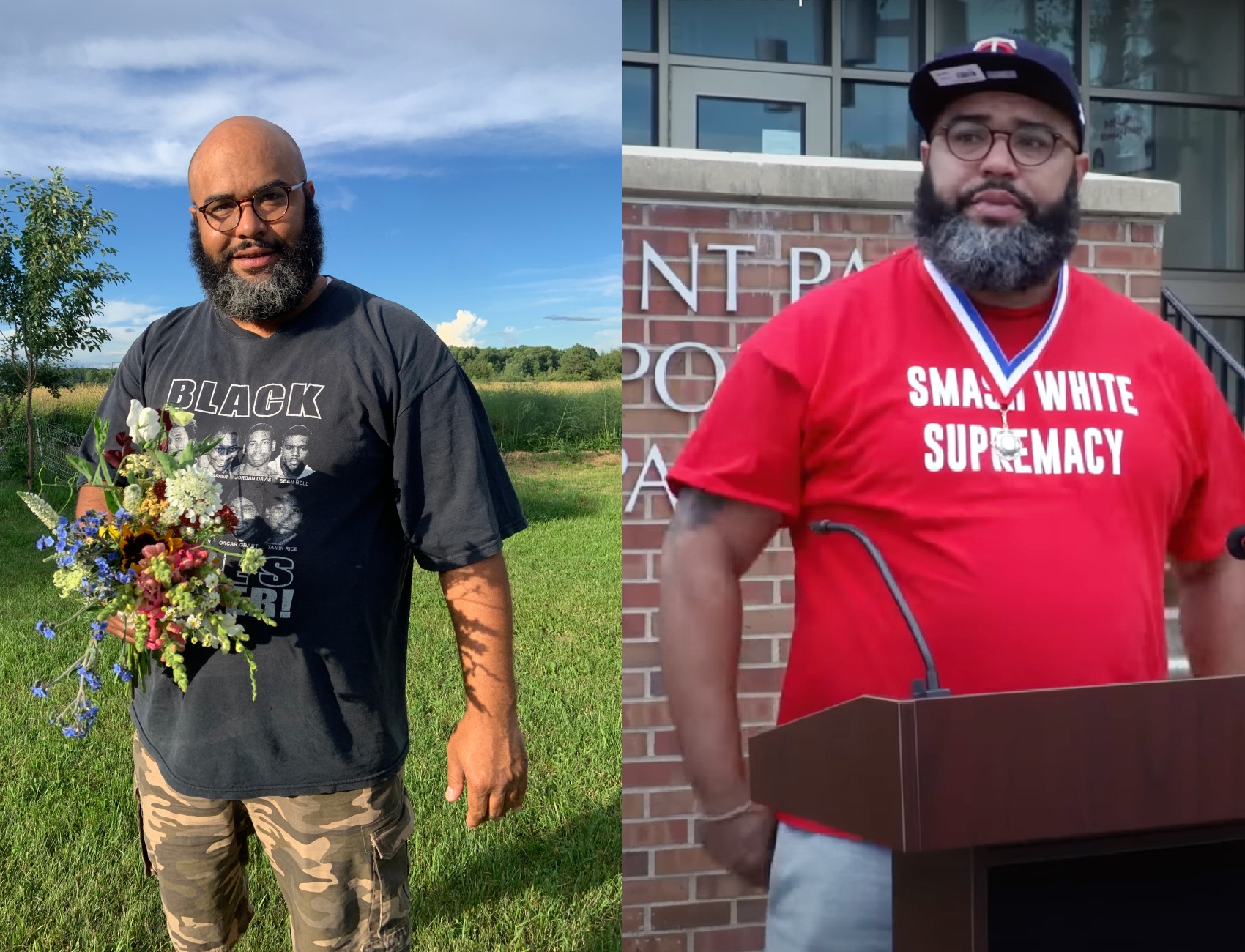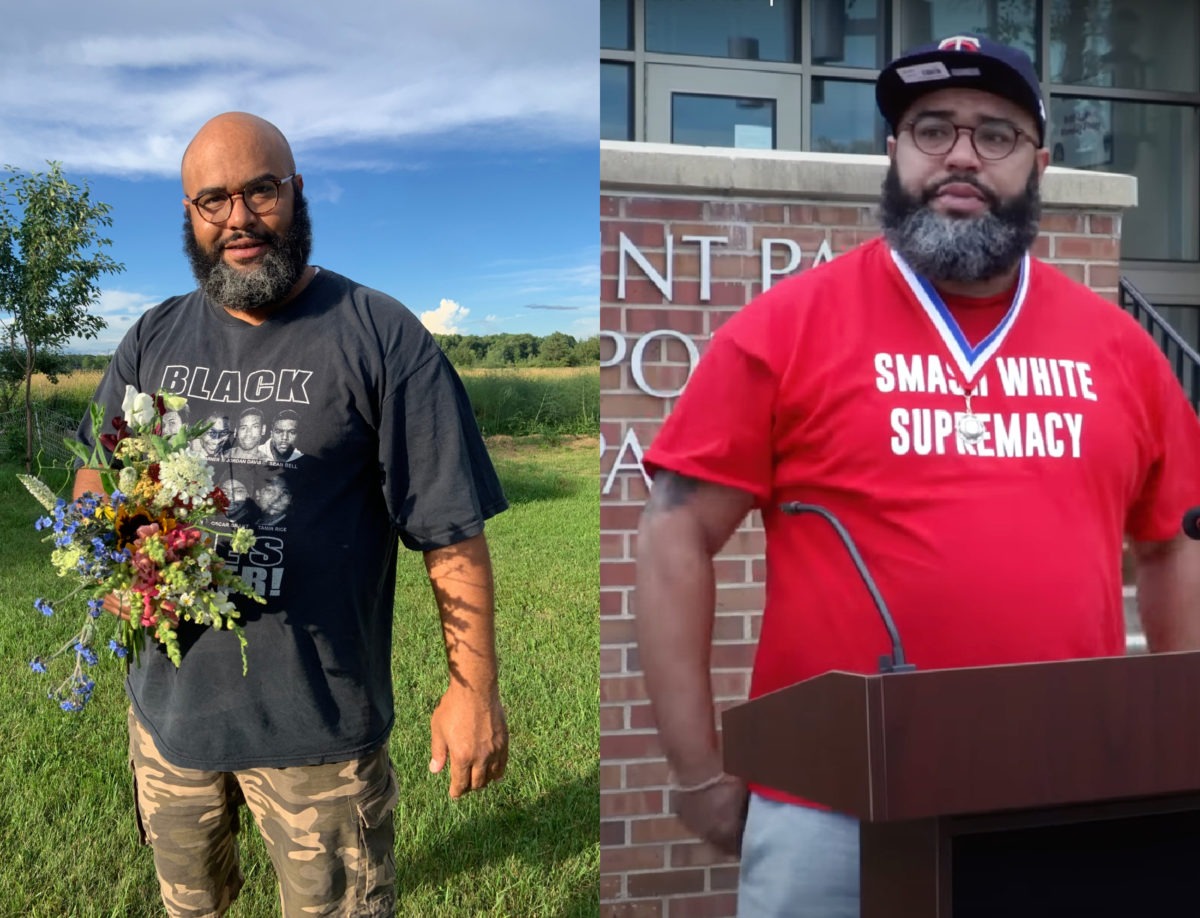Newsletter
Riots Work: An interview with Alex Mingus
Police gave Alex Mingus an award for saving a shooting victim’s life. Mingus showed up wearing a shirt that said “Smash white supremacy”.


Riots Work: An interview with Alex Mingus
with Alex Mingus and Elizabeth Weill-Greenberg
In October, outside the Saint Paul, Minnesota, police station, Alex Mingus was presented with the Chief’s Award for Valor for saving the life of a shooting victim. Mingus stepped up to the podium to accept the award—then took his sweatshirt off, revealing a t-shirt underneath that said: “Smash white supremacy.”
“I do not rock with the police,” he said. “They don’t keep us safe. We keep us safe. Riots work.”
Mingus teaches with the Minneapolis-based group, Atlas Defense Violence Prevention Training, which provides classes on permit-to-carry. He told The Appeal he is a member of the Wild Path Collective, which Mingus described as a “multicultural, intergenerational” group of like-minded people who are “trying to do some wonderful things.”
The collective’s working farm in Wisconsin is part of the group’s 100-year plan to “help the land heal,” and to “bring Black and brown, indigenous, trans, queer folks out to the land to help them heal as well.”
Wild Path Collective, he said, is “trying to create almost like a new society where we’re doing things the right way and with everyone in mind.”
Mingus spoke with The Appeal about the police as an occupying force, riots, and how to keep communities safe.
This interview has been edited for length and clarity.
Q: What role do the police currently play in your community and what role, if any, should they play?
A: I see them as sort of like an occupying force. Police respond to crime. They don’t prevent crime. And on the off chance that they do prevent something from happening, it’s usually because they stumbled upon something
They’re crime responders, and one of the biggest gangs I think in our country. But what role do I think they should play?
I don’t see something that was set up to catch slaves having any positive benefit in our communities. It was set up to protect rich white people’s property and that’s still what they do today.
Q: In your speech, you said the police don’t keep us safe, we keep us safe. Can you tell me more about that?
A: During the uprising, we were literally keeping ourselves safe because where I live—I live sort of in between George Floyd Square and the third precinct, much closer to the third precinct. Me and some of my kids and a few of my neighbors were up most nights till three, four in the morning, holding our block down.
It’s really about us keeping us safe, right?
I know my neighbors. I know who lives around me. We speak. We’re not in silos. If somebody needs something or if there’s some sort of emergency, we know that we can call on each other before we necessarily have to call 911. Now, there’s a difference between medical emergency and non-medical emergency. And I’m not afraid to call 911 for a medical emergency.
I won’t call 911 for the police.
Q: That day when there was a shooting, can you tell me about what happened and your thoughts as you saw the police cars going past you?
A: Well, in the moment, I didn’t know that the shooter was back up towards the original scene of the shooting. I was a block down from where the shooting had taken place and with the victim.
It was frustrating. I was literally in the middle of the streets trying to get in front of their cars. I thought they were coming for the shooting victim, unaware that they were going to the shooter. There were nine squads that passed me. One of them should have peeled off and at minimum thrown me a tourniquet.
The Saint Paul Police Department did not immediately respond to a phone call from The Appeal seeking comment. In a statement published by the local FOX affiliate, the department said: “Shooting scenes can be very chaotic. As officers respond to these calls, critical information comes at them quickly and they are focused on preventing the suspect from returning or harming more people while also securing the scene for Saint Paul Fire paramedics to come in and treat the victim.”
Q: You said in your speech riots work. Can you tell me more about that?
A: I saw it spray painted on Minneapolis Police Department’s First Precinct in our downtown during—we had marched from the Government Center to the First Precinct downtown after Amir Locke was murdered.
And I thought, “Oh shit, that’s dope.” We seen it firsthand. After the uprising, the only reason we got movement is because things were burning.
There’s always going to be, well, what about a small business and what about mom-and-pop shops? And yes, I think it is quite unfortunate when people who have played this capitalist game and gotten to a point where they own a business—it does suck when they lose the things, but also you’re playing the capitalist game. Most things in this country have been moved forward by force.
Q: What has the response been since you gave your speech?
A: For me to have another 40-something dad message me and say, “Hey, man. I showed your video to my sons. We’re really proud of you.” It’s like—I’m fighting back tears now. I’ve just been overwhelmed with the love.
I’ve gotten messages from Germany, Australia, Chile, the UK. I’m really blown away and really humbled and grateful. I’m really grateful for the amount of love that I’m getting.
Update: After publication, St. Paul Public Information Officer Sgt. Mike Ernster told The Appeal that, “Sometimes it looks like officers are going by you and not stopping to help but they’re also trying to problem solve and prevent more victims from being impacted by this person.”
As for Mingus’s actions—stopping his own vehicle, getting out, and tending to the gunshot victim—he said, “We’re very happy that Mr. Mingus was there to make a difference for that victim that day. It’s great that he did stop because a lot of people don’t.”
In the news
Cook County Sheriff Tom Dart is undermining a new law that is supposed to allow people on electronic monitoring to run occasional errands without risk of arrest and incarceration. [Maryam Saleh / The Intercept]
Staff of New York’s Rochester Police Accountability Board (PAB) are unionizing. The PAB secretary said that the working conditions have “grown intolerable.” They are calling on the mayor and city council to recognize their union. [Patrick Moussignac / News10NBC]
Investigative Post obtained transcripts of depositions provided by retired Buffalo, New York, police officers in a case alleging that the department engaged in racially discriminatory policing. Lt. Thomas Whelan admitted that he and other officers called community members the N-word, but a “good verbal thrashing beats going to jail any day.” [Geoff Kelly / Investigative Post]
A Republican who has vowed to enforce abortion laws in a state where abortion may soon become illegal won one of the biggest prosecutor races in the country last week. Maricopa County Attorney Rachel Mitchell defeated her Democratic challenger and secured another term as Maricopa County’s top prosecutor. [Meg O’Connor / Twitter]
Voters ousted Bristol County, Massachusetts, Sheriff Thomas Hodgson. His defeat ended a “25-year reign marked by extreme medical neglect, mounting jail suicides, and staunchly anti-immigrant policies,” writes Alex Burness for Bolts. [Alex Burness / Bolts]
ICYMI — from The Appeal
New York’s prison package ban forces people to turn to expensive third-party vendors to send products to their incarcerated loved ones. As Molly Hagan reports, the policy is doing disproportionate harm to women, both inside and outside of prison.
As it turns out, repeatedly yelling “crime” at voters—both literally and figuratively—is not a winning election strategy. Jerry Iannelli and Nick Wing explain how both parties miscalculated on crime, and what Democrats should take away from the results.
That’s all for this week. As always, feel free to leave us some feedback, and if you want to invest in the future of The Appeal, please donate now and your donation will be tripled here.
